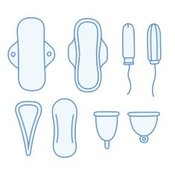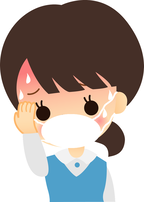|
1/11/2021  I no longer menstruate. Is that Too Much Information (TMI) for you? Maybe not. If you are a teacher, you may be in a stage of menopause yourself. (76% of US teachers are female; 30% of them are age 50 or over) If you are a younger female, your day will come.  Maybe, like me, you are going the hormone-free route, or natural treatments have been ineffective for you, and you experience hot flashes during your workday. How about night sweats? Have they interrupted your ability to get a full night’s sleep on a school night? Mine have had the domino-effect of so impacting my sleep that my early morning weekday workouts are a thing of the past, resulting in a more dejected outlook.  Are you experiencing some other menopausal symptoms that effect you at work—like increased anxiety, irritability, or more frequent urination? For sure, any of those will make managing a classroom more challenging. And yet, after over three decades of working in education with a majority of female staff members, I have never heard these challenges discussed as a workplace issue.  If you live in the United States, it may surprise you to know that the United Kingdom’s National Education Union (NEU) offers its members a guide to working through menopause and there is information on their website which recognizes that menopause is an occupational health issue for women educators, as well as also being an equality issue. In fact, the NEU broadcasts that members should not feel that they are the only person who is affected by or concerned about a particular issue “because this is seldom the case”. NEU members have the advantage of being able to act collectively with the confidence of knowing that they have the weight of the union behind them (https://neu.org.uk/advice/working-through-menopause ). The UK also has Education Support, a charity dedicated to improving the health and wellbeing of the entire education workforce. Their website contains information about the specific challenges of dealing with symptoms of menopause in an education context.  Its true that male academics between the ages of 45 and 55 also have health-related challenges. Men in that age range have an increased risk of developing hypertension, cholesterol problems, coronary complications, diabetes, and prostate cancer. But in the case of men, these health issues have been normalized. For example, many would understand a male administrator or professor taking a sabbatical, recovery time, or reducing work hours due to a coronary procedure or cancer treatment. We would expect his work performance to decrease.  Is this the same view that society takes of women’s hormonal changes? Menopause is a common health condition, usually accompanied by anxiety, reduced ability to concentrate, hot flashes, and other symptoms. However, these symptoms are often categorized as female hysteria, lack of attention, or failure to work on a team.  One reason for the disparity in the ways that men’s and women’s aging conditions are viewed is the disproportion with which the subjects are raised. We talk a lot about heart disease, hypertension, and cholesterol levels, but we do not speak about the menstrual cycle or menopause. The topics are still taboo and their implications on female academicians and their workplaces to not get addressed.  Menopausal women have special needs. If this is not recognized and carried to the same normalization that motherhood enjoys today, it will keep being an issue that women are ashamed of. Lack of work accommodations facilitates a culture where bullying and corrupt work practices can flourish.  Schools and colleges could take some practical steps to minimize the most common menopausal symptoms. They can offer ways to cool the working environment (access to open windows, fans, air conditioning), provide access to cold drinking water, provide facilities for staff to shower or change during the day, and provide arrangements for teachers/instructors to take toilet breaks during lesson time. As a biology teacher, I discuss menopause during the unit I teach on reproduction. Students are usually quite interested to understand the differences in fertility among males and females. I have always been forthcoming with students about my age and the frequency with which I put on and take off my sweater has prompted discussions about hot flashes a couple of times. (This Covid-19 school year has been particularly challenging with the added heat produced by wearing a face mask).  Students also complete a “Do Now” in my class called Can Diet Delay Menopause? As with other “Do Nows”, students generate context-based guesses to fill in the blanks of a reading selection. This is intended to be a tie-in to reproduction, biochemistry, and human body units. It is also a way to normalize the topic of routine hormonal changes that happen to women as they age. Its time we stopped thinking about menopause as TMI.
0 Comments
|
AuthorGertrude Katz has spent over 30 years teaching K-12 public school students all major subjects. She has taught biology and education at the college level. The majority of her career has been spent instructing biology at the secondary level. Categories
All
|


 RSS Feed
RSS Feed